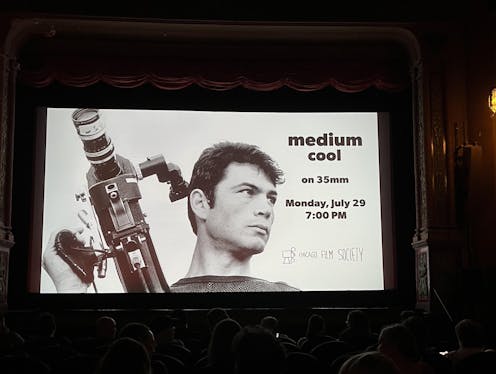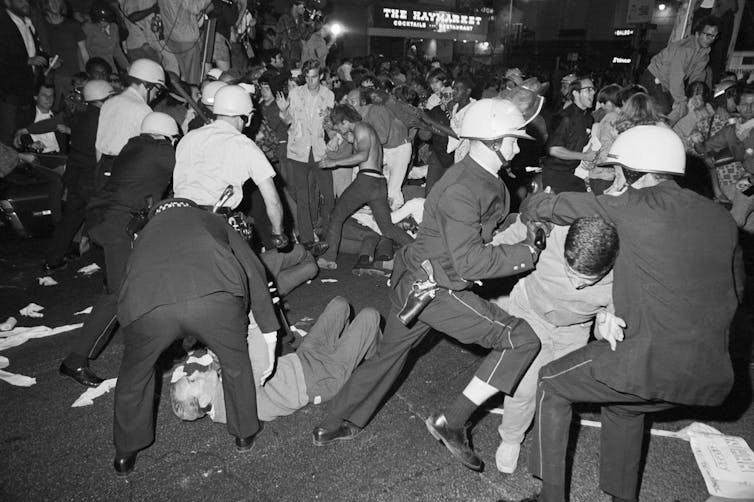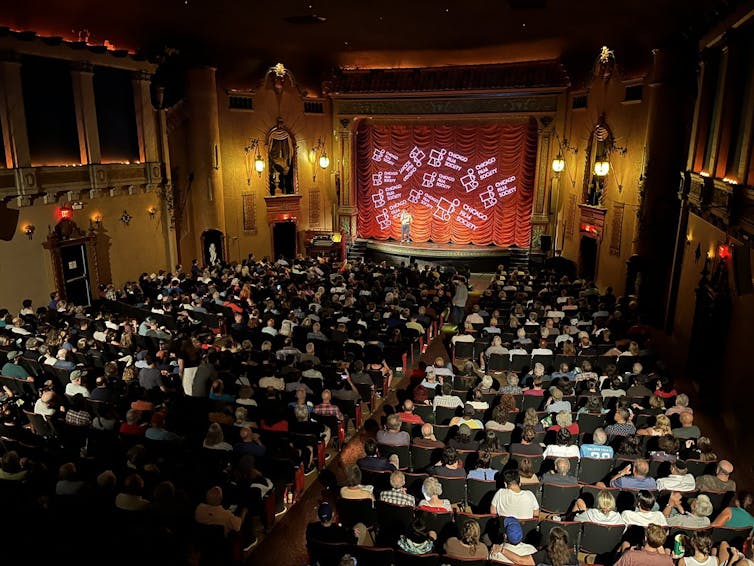Chicagoans watch films of the violent 1968 convention protests to get ready for the Democratic convention
- Written by Heather Hendershot, Professor of Communication Studies and Journalism, Northwestern University
 Viewers in Chicago await a screening of the film 'Medium Cool,' focused on the 1968 Democratic convention in Chicago. Heather Hendershot, CC BY
Viewers in Chicago await a screening of the film 'Medium Cool,' focused on the 1968 Democratic convention in Chicago. Heather Hendershot, CC BYOn the third day of the 1968 Democratic National Convention, Chicago police beat protesters in a free-for-all on Michigan Avenue. The iconic images of that melee have since been incorporated into almost every documentary on America in the 1960s or about the war in Vietnam.
But these are not the only images from those dark days. In fact, Chicagoans have recently revisited some of the greatest films of that moment, as there is tremendous interest in stories about the history of that violent and troubled year’s Democratic convention, sparked by the decision to hold this year’s convention in the same city that saw that earlier unrest.
In late spring 2024, four short 1969 documentaries made by Chicago’s Film Group were screened at the Chicago Cultural Center. Film Group was a successful commercial producer for clients such as Kentucky Fried Chicken. They added political filmmaking to their repertoire in the summer of 1966, when Rev. Martin Luther King Jr. and the Southern Christian Leadership Conference came to town to engage in an ultimately futile battle against housing discrimination.
 Police attack demonstrators on Chicago’s Michigan Avenue during the Democratic National Convention on Aug. 28, 1968.Bettman/Getty Images
Police attack demonstrators on Chicago’s Michigan Avenue during the Democratic National Convention on Aug. 28, 1968.Bettman/Getty ImagesThe theater was filled with journalists, octogenarian activists and a handful of quinquagenarians such as myself, all eager to view these gripping documentaries that included not only famous footage of Michigan Avenue but also images that have circulated much less since 1968.
Those included Mayor Richard Daley stating, following the assassination of King, that the police should “shoot to kill any arsonists” and “shoot to maim or cripple anyone looting” – suggestions he later claimed he never made.
‘Searing indictment’ of Daley
In late July 2024, the Music Box Theatre showed another Film Group short, followed by Haskell Wexler’s “Medium Cool,” a drama about an almost-completely amoral TV news cameraman.
The film unfolds its story in two different ways. One scripted and sometimes rather stiff storyline follows a budding relationship between the cameraman and a young Appalachian woman. The other interconnected story is unscripted and more explicitly political, featuring documentary footage of 1968’s street violence and interviews with Black activists, and raising questions about media ethics and the policies of Daley’s police.
The original trailer for ‘Medium Cool.’The movie is ultimately a searing indictment of both Daley’s “law and order” tactics – language that Daley used, echoing Richard Nixon – and of television itself. It celebrates the depth of film over the facile shallowness of what snobs used to call television: “the idiot box.”
The house was packed. To my right sat a film student attending at his professor’s urging. The place was, in fact, full of young cinephiles, enraptured by an introduction by Julian Dibbell of the Chicago Film Society, who celebrated the fact that now, at last, the city has its very own new 35mm print of this most-Chicago-of-all film. Adding another detail that was catnip to film nerds, Dibbell explained that a fun song had been restored to the film’s roller derby scene, long lacking from streaming and DVD versions of “Medium Cool” because of rights issues.
On my left were three older men who had worked with Wexler in the 1970s. One had seen “Medium Cool” multiple times, but it had been a while. Afterward, he observed correctly that a good editor could have trimmed 20 minutes to tighten up the picture’s wonky pacing.
Re-viewing it for the umpteenth time, I was particularly struck by the film’s gaps in political context, in stark contrast to the Film Group productions. “Medium Cool” offers a strong critique of violence, and media exploitation of that violence, and it makes a reference to Chicago’s Red Squad – a police surveillance unit targeting communists and others deemed “radical” – that would be lost to many viewers then and now.
Yet Wexler fairly presumed that 1969 viewers would already know most details about the 1968 presidential race. Where does this leave contemporary viewers who aren’t history buffs, over half a century later?
 The crowd at the Chicago screening of Haskell Wexler’s film ‘Medium Cool.’Chicago Film Society, CC BY
The crowd at the Chicago screening of Haskell Wexler’s film ‘Medium Cool.’Chicago Film Society, CC BY‘Not going to take it anymore’
Exiting the theater, I stopped to talk to an energetic young woman gearing up for a march in support of reproductive and queer rights, and against the Democratic convention and genocide in the Gaza Strip.
She felt that Kamala Harris was not very different from Joe Biden, and that neither politician was more than marginally better than Donald Trump. As for the film, she could not have cared less about the hero but offered that the sound design was exceptional – fair criticism and accurate praise.
It seemed that “Medium Cool” had not taught her too much about 1968, and yet her stance on systemic injustice resonated with me as a historian. Few activists showed up at the Democratic National Convention in 1968 to support its presidential nominee, Hubert Humphrey or attack Nixon. Those men simply weren’t their focus. They were there to protest the whole goddamn crisis of American politics.
The year 2024 is not 1968, but films about that period in American politics capture a feeling that has again taken hold almost 60 years later. It seems likely the streets of Chicago will soon once again fill with people who are, as the protagonist Howard Beale said in his famous rant in the movie “Network,” “mad as hell, and I’m not gonna take this anymore.”
Heather Hendershot does not work for, consult, own shares in or receive funding from any company or organization that would benefit from this article, and has disclosed no relevant affiliations beyond their academic appointment.
Authors: Heather Hendershot, Professor of Communication Studies and Journalism, Northwestern University
